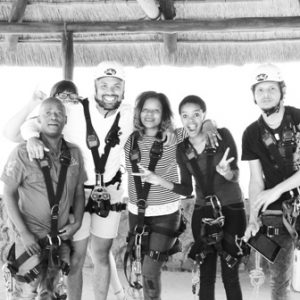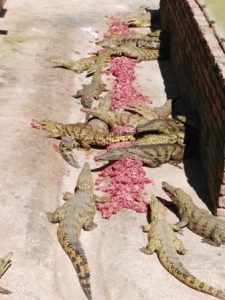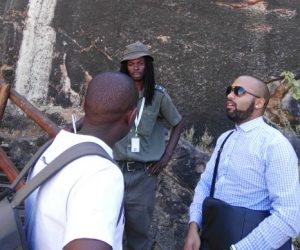
My body has frozen in our frosts and in our latter-day snows. It has thawed in the warmth of our sunshine and melted in the heat of the midday sun. The crack and the rumble of the summer thunders, lashed by startling lightning, have been a cause both of trembling and of hope.
The fragrances of nature have been as pleasant to us as the sight of the wild blooms of the citizens of the veld,” this is the famous poem made popular by our astute former President Thabo Mbeki.
The above fits perfectly well like a glove what yours’ truly, experienced, imagined during the celebrations of Tourism Month media launch in Limpopo recently.
The province is vastly known for its regal tourism destination hot-spot and as part of the media blitz-over four hot, humid days- we did the unthinkable, that one cannot fathom to imagine.
From the unusual- first time adventurous experience- the Zipline Adventure activity at Waterberg to humongous Crocodile feeding; that was followed by lunch and forbidden waters’ at the Euphoria Golf Estate, found only two hours drive from Johannnesburg.
All this performed under the soaring heat Limpopo Province is synonymous for.
Our hosts Limpopo Tourism Agency-whose mandate is to market and promote tourism in the region- went all out to make our stay as favourable as possible.
As a result of trembling and ache-body for some, we took a well deserved break at some lodge in Polokwane not far from the City Center.
And of course, what would the press launch at Porche-Villa (Thohoyandou) be without the immaculate and intelligent current LTA board chairperson Andrew “Druza” Dipela, who gave us a breakdown and mandates to be executed pre and post his term in turning around the misfortunes at the agency.

Posed to him what Tourism Month celebrations means to the people of the province, he shot from the hip by responding:” We must simply offer them what they’re not exposed to.”
“We must make sure our International Airport is effective and productive, improve our adventure tourism because this is what sets apart this eye-catching province from our competitors.
This is what we must present to our masses,” says the man whose better credited or known for the famous ‘iticket esandleni’ during his tenure as PSL spin-doctor.
Although the burning issue of transformation within the tourism sector was side stepped, Dipela strongly believes transformation can only be regulated if, the scorecard is adhered to and established enterprises such as lodges, hotels, game reserves give back to the blacks.”
“Not in terms of money”, he warned, “but by equipping them with knowledge and education, so we can sustain ourselves. This will see the fruition of transformation.”
“Its’ not easy to let go, because the minority are the majority owners when coming to economical policy interpretations and regulations within the sector, therefore this ugly head will keep surfacing”, he said on the sidelines.
This year’s theme ‘Universal Access’- Tourism for All- means its everyone’s business, including the disabled, whom interestingly contribute huge chunk of economy spin-offs abroad within the tourism and hospitality sector.
Concurred the Department of Tourism -Domestic chief director- Peter Myron that the sooner our establishments adhere and redesign their accessibility, the better economical benefits thereof.
“Obviously this is not going to happen overnight but in partnership with the Tourism Grading Council, we shall make inroads,” he said.
As soon as we completed our assignments and bedazzled by cultural dances, we headed off to Mapungubwe World Heritage Site, perched not far from the town of Musina (towards Zimbabwe border-gate).
Better known as an Ancient Kingdom in the Limpopo Valley, declared by UNESCO as a World Heritage Site Mapungubwe on July 2003- was once the capital of a country as large as Swaziland, surrounded by more than 200 satellite towns.

Controversy mounts regarding the origin and meaning of the name Mapungubwe. Conventional has it
that Mapungubwe means “place of Jackals,” or alternatively, “place where Jackals eat” or, according to Fouche’-one of the earliest excavators of Mapungubwe-“hill of the jackals”. It also means “place of wisdom” and “the place where the rock turns into liquid”- from various ethnicities in the region including the Pedi, Sotho and Shona.
In Shona, the language spoken by the majority of people in Zimbabwe, the word mapungu is the plural form of the word chapungu, denoting the bateleur eagle, which is widely believed to be the model for the Zimbabwean birds that once graced the massive Great Zimbabwe royal complex.
The ending “bwe” is a diminutive of the word “ibwe,” which means stone or rock in Shona language.
Mapungubwe, in this respect, means the ‘rocks of the bateleur eagles’ – an indication that there were many bateleurs in the area or location.
Chapungu Village in Harare, Zimbabwe’s capital, which showcases the country’s arts and sculpture traditions, is a tribute to the spirit of the bateleur, a bird which has deep religious connotations in Shona culture.
But as for our competent and soft speaking guide would have it the dread-locked Cedrick Setlhako, there are nations who also lay claim to this heritage site (mentioned above), as he took us up the man-made stairs to the Sacred Hill- for it is believed former warriors and Kings are buried and the discovery of artifacts like beads, ivory, animal bones, pots and vast quantities of gold.
Mapungubwe, also forms part of the Greater Mapungubwe Transfrontier Conservation Area, known as Limpopo/Shashe TFCA shared by SA, Botswana and Zimbabwe.
So, exactly what Mapungubwe means and where it originates from still remains a mystery. Amen!
As we wrapped up our four day tour, we made a turn at Dzata Museum-Thohoyandou (elephants head) for a quick but intuitive tour.
Our guide only known as Mpho, has it that Venda people originated from the North East Africa, from where they immigrated to Zimbabwe to form part of the Great Zimbabwe Empire and the Vhalozwi.

The Vhalowzi group split into two groups of which one halve moved southwards to settle in what today is Tshiendeulu under the leadership of King Dimbanyika.
After his death, people moved to the present day Dzata, which was later abandoned in 1740 AD.
For more information on the museum, its archaeological site, sacred drum of the Gods, visit golimpopo.com
As indicated in my first stanza (opening of the poem) I owe my being to the hills and the valleys, the mountains and the glades, the rivers, the deserts, the trees and the flowers of this majestic country of mine, I call mzansi!
